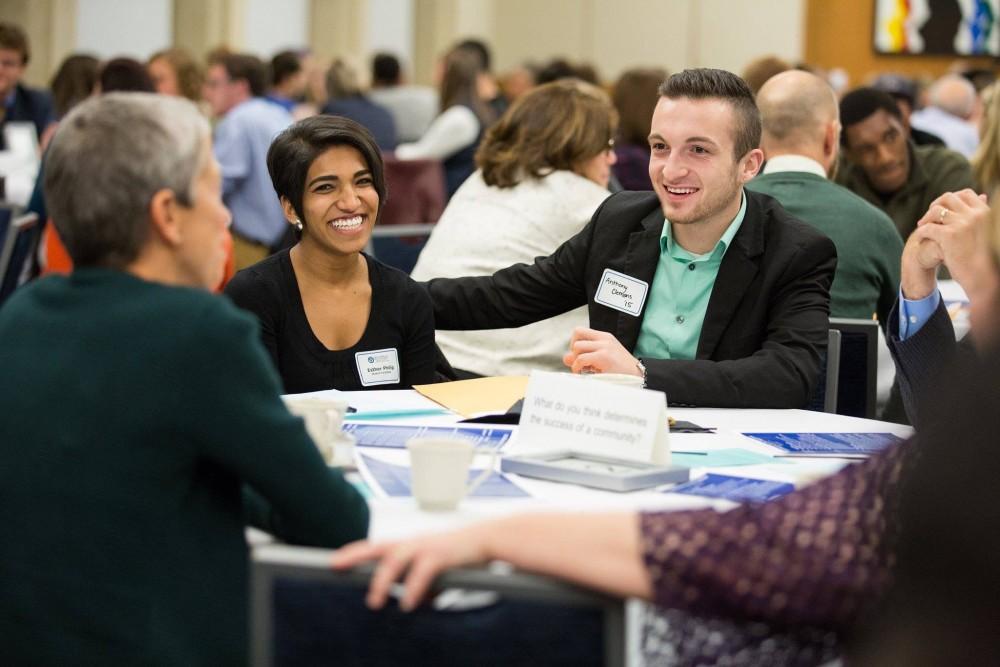Fifth annual Civil Discourse Symposium breaks down climate change

Courtesy / GVSU Brooks College of Interdisciplinary Studies Facebook Page
Oct 29, 2018
On Oct. 25, Grand Valley State University hosted the fifth annual Padnos/Sarosik Civil Discourse Symposium, facilitated by Professor of Civil Discourse Elizabeth Arnold, at the Eberhard Center on the Pew Campus.
The Symposium offered a venue for all members of the community to engage in a civil discourse on conversations on climate change, where a diversity of perspectives were represented. A civil discourse is defined as an engagement in conversation intended to enhance understanding.
“The topic of the symposium was climate change, but the event was not intended to debate global warming — but in fact to demonstrate that we can have civil conversations about this topic and potentially discuss constructive solutions for climate change mitigation and adaptations to impacts of climate change, even if we disagree,” Arnold said. “Learning and practicing engagement with individuals, groups, politicians and others that you disagree with about a key topic in our daily lives in a manner that does not resort to name calling, yelling, online trolling and dismissal is something we should all be doing as informed and active citizens. The event was not set up to be a debate but to allow attendees to engage with a variety of individuals and groups that have a stake in the topic.”
The event consisted of a small panel with three professionals – West Michigan Clean Energy Organizer for the Sierra Club Jordan Chrispell, Director of Environmental Studies at GVSU Kelly A. Parker and speaker/author/researcher Steve Goreham.
The prompt the panelists were asked to answer regarded an Intergovernmental Panel on Climate Change (IPCC) report citing that current global warming impacts are indicative of food shortages, wildfires and a die-off of coral reefs as soon as 2040. With President Donald Trump dismissing those claims, the panel was asked what they should do as a response.
“I purposely kept that formal portion of the event small in order to allow for more time for attendees at the symposium to mingle and engage with a variety of people at the event,” Arnold said. “Climate change is such a complex issue and there are many voices to be heard on this issue.”
Chrispell’s perspective included discussion on the Michigan Chapter’s priorities, which focused on the notion on what every child deserves to inherit. He said that future generations are entitled to clean air, water and energy, but this is only acquired through public participation in democracy and holding elective officials accountable.
Parker touched on the importance of philosophy in encouraging discourse. Goreham focused on informing the community of climate science and energy economics, and was not without controversy.
“Many feel that the evidence of climate change and global warming, and their anthropogenic causes are extremely well established and understood by this time and that those who deny this are part of a well organized campaign of seeding doubt about climate science, and this is dangerous propaganda,” Arnold said.
Alongside the formal discussion, the event also offered an informal portion as well, ensuring that every attendee found a position they were most comfortable in. In a round table setting, guests discussed wind energy and climate change in the arctic among other topics.
“The more informal portion of the event was centered at the various tables in the room, so people were able to discuss and engage in small groups,” Arnold said. “I prompted the room at various times in the event — approximately every 15 minutes — to move to another table and engage with another individual/group/perspective. These table hosts included GVSU faculty from biology, geology, anthropology, education, political science, natural resource management, sociology and philosophy as well as community groups including Citizen’s Climate Lobby, the Acton Institute, Michigan League of Conservation Voters and Schrems West Michigan Trout Unlimited.”
For students and/or community members that were unable to attend the event but are interested in making a difference in addressing the issue of climate change on campus, Arnold said that there are still plenty of ways to get involved.
“Learning and practicing engagement with individuals, groups, politicians and others that you disagree with about a key topic in our daily lives in a manner that does not resort to name calling, yelling, online trolling and dismissal is something we should all be doing as informed and active citizens,” Arnold said. “This is not a topic we can ignore. We must all be engaged, informed and active citizens.”

























